
Hans-Georg Gadamer was a German philosopher of the continental tradition, best known for his 1960 magnum opus, Truth and Method, on hermeneutics.

Jürgen Habermas is a German philosopher and social theorist in the tradition of critical theory and pragmatism. His work addresses communicative rationality and the public sphere.

Literary criticism is the study, evaluation, and interpretation of literature. Modern literary criticism is often influenced by literary theory, which is the philosophical discussion of literature's goals and methods. Though the two activities are closely related, literary critics are not always, and have not always been, theorists.
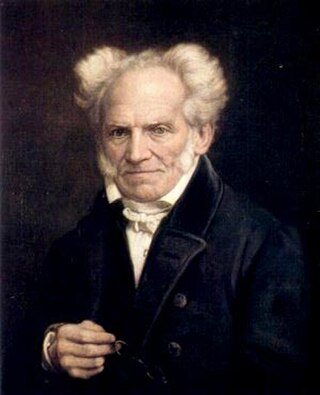
German philosophy, meaning philosophy in the German language or philosophy by German people, in its diversity, is fundamental for both the analytic and continental traditions. It covers figures such as Gottfried Wilhelm Leibniz, Immanuel Kant, Georg Wilhelm Friedrich Hegel, Karl Marx, Friedrich Nietzsche, Martin Heidegger, Ludwig Wittgenstein, the Vienna Circle, and the Frankfurt School, who now count among the most famous and studied philosophers of all time. They are central to major philosophical movements such as rationalism, German idealism, Romanticism, dialectical materialism, existentialism, phenomenology, hermeneutics, logical positivism, and critical theory. The Danish philosopher Søren Kierkegaard is often also included in surveys of German philosophy due to his extensive engagement with German thinkers.
The Counter-Enlightenment refers to a loose collection of intellectual stances that arose during the European Enlightenment in opposition to its mainstream attitudes and ideals. The Counter-Enlightenment is generally seen to have continued from the 18th century into the early 19th century, especially with the rise of Romanticism. Its thinkers did not necessarily agree to a set of counter-doctrines but instead each challenged specific elements of Enlightenment thinking, such as the belief in progress, the rationality of all humans, liberal democracy, and the increasing secularisation of society.
William Vaios Spanos was a Heideggerian literary critic. Spanos was a Distinguished Professor of English and comparative literature at Binghamton University, Binghamton, New York; he was a founder and editor of the critical journal boundary 2. His work draws heavily on the philosophical legacy of Martin Heidegger, and while it does show the influence of the deconstruction of Jacques Derrida and Paul de Man, Spanos's vocabulary and concepts remain closer to Heidegger's Destruktion ("destruction") of metaphysics than to its philosophical successors.
This is an alphabetical index of articles about aesthetics.

Gianteresio Vattimo is an Italian philosopher and politician.
Gottfried Boehm is a German art historian and philosopher.
Joel Black is a Professor of Comparative Literature at the University of Georgia in Athens, Georgia. Black has written extensively on subfields of literature and film studies areas such as romanticism, postmodernism, philosophy and history of science, and cultural studies. He is the author of The Aesthetics of Murder: A Study in Romantic Literature and Contemporary Culture (1991) and The Reality Effect: Film Culture and the Graphic Imperative (2002).
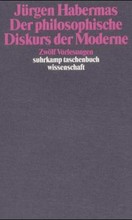
The Philosophical Discourse of Modernity: Twelve Lectures is a 1985 book by the philosopher Jürgen Habermas, in which the author reconstructs and deals in depth with a number of philosophical approaches to the critique of modern reason and the Enlightenment "project" since Georg Wilhelm Friedrich Hegel and Friedrich Nietzsche, including the work of 20th century philosophers Max Horkheimer, Theodor Adorno, Martin Heidegger, Michel Foucault, Jacques Derrida, Cornelius Castoriadis and Niklas Luhmann. The work is regarded as an important contribution to Frankfurt School critical theory. It has been characterized as a critical evaluation of the concept of world disclosure in modern philosophy.
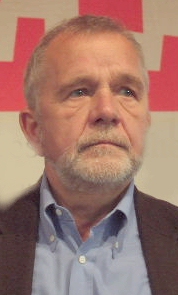
Rüdiger Safranski is a German philosopher and author.
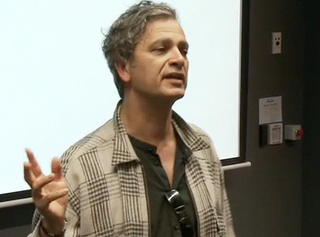
Nikolas Kompridis is a Canadian philosopher and political theorist. His major published work addresses the direction and orientation of Frankfurt School critical theory; the legacy of philosophical romanticism; and the aesthetic dimension(s) of politics. His writing touches on a variety of issues in social and political thought, aesthetics, and the philosophy of culture, often in terms of re-worked concepts of receptivity and world disclosure—a paradigm he calls "reflective disclosure".
This is a list of articles in continental philosophy.
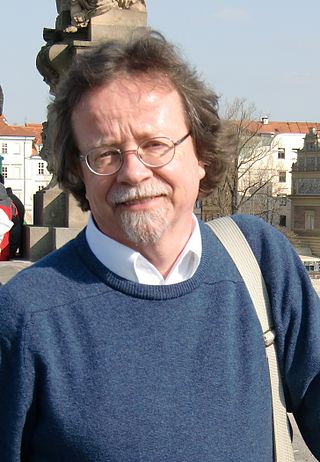
Christoph Bode is a literary scholar. His fields are British and American literature, comparative literature, literary theory, narratology, and travel writing. He is full professor and chair of Modern English literature in the Department of English and American Studies at Ludwig-Maximilians-Universität München. Since 2009, Bode has been a reviewer and occasional columnist for Times Higher Education.
Andrew S. Bowie is Professor of Philosophy and German at Royal Holloway, University of London and Founding Director of the Humanities and Arts Research Centre (HARC).

Kurt Mueller-Vollmer, born in Hamburg, Germany, was an American philosopher and professor of German Studies and Humanities at Stanford University. Mueller-Vollmer studied in Germany, France, Spain and the United States. He held a master's degree in American Studies from Brown University, and a doctorate in German Studies and Humanities from Stanford University, where he taught for over 40 years. His major publications concentrate in the areas of Literary Criticism, Hermeneutics, Phenomenology, Romantic and Comparative Literature, language theory, cultural transfer and translation studies. Mueller-Vollmer made noteworthy scholarly contributions elucidating the theoretical and empirical linguistic work of Wilhelm von Humboldt, including the discovery of numerous manuscripts previously thought lost or otherwise unknown containing Humboldt's empirical studies of numerous languages from around the world.
Norbert Miller is a German scholar of literature and art. He was professor of literary studies at the Technische Universität Berlin from 1973 and retired in 2006.
Harro Müller is a German literary scholar, Emeritus Professor of Germanic languages at Columbia University, a former Chair of the German department at Columbia (1996-1999), and a former executive editor of The Germanic Review (1996-2002).










